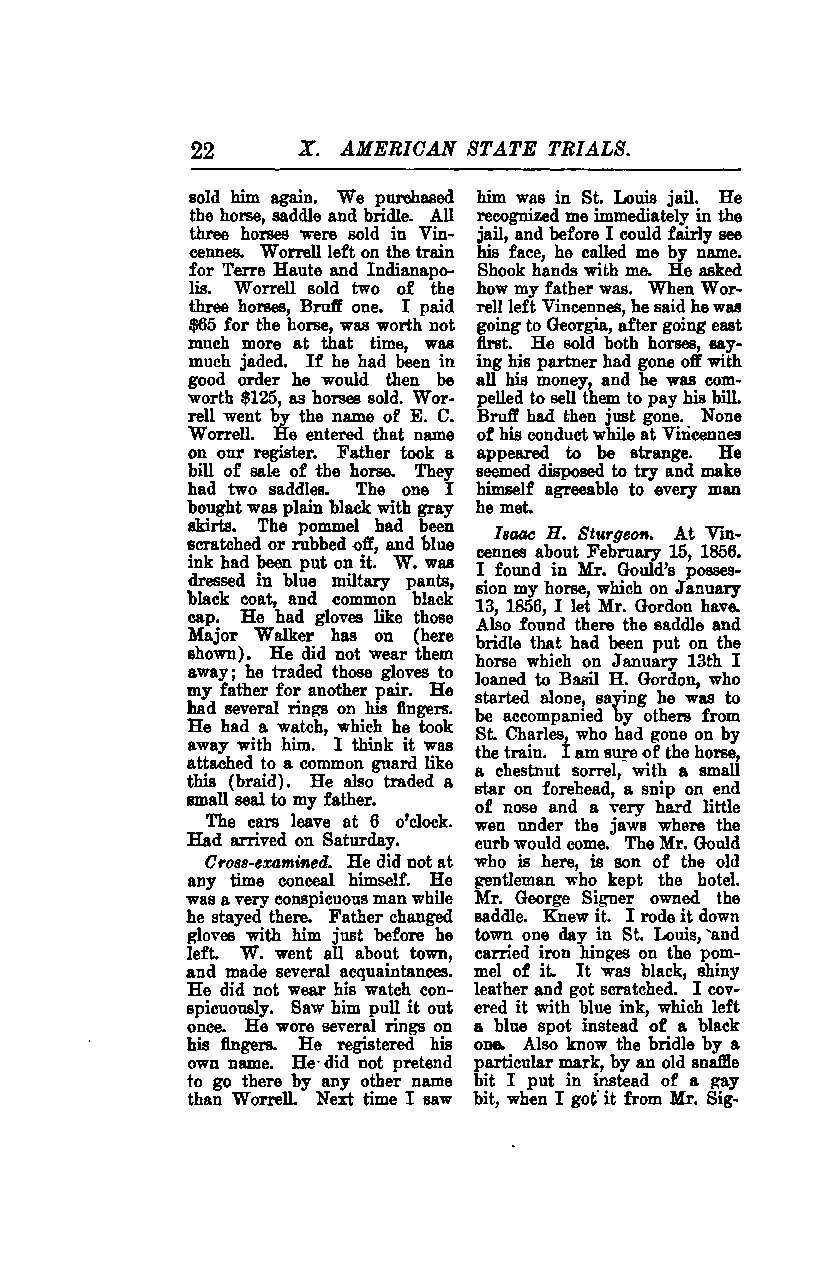
Here is the translated text as follows:
X. AMERICAN STATE TRIALS
We purchased the horse, saddle, and bridle from Worrell after he sold him again. All three horses were sold in Vincennes. Worrell then left on the train for Terre Haute and Indianapolis. He sold two of the three horses, while Bruff sold one. I paid $65 for the horse, which was worth not much more at that time as it was quite jaded. If it had been in good order, it would have been worth $125, as horses were sold then. Worrell went by the name of H. C. Worrell and entered that name on our register. My father took the bill of sale of the horse. They had two saddles; the one I bought was plain black with gray skirts. The pommel had been scratched or rubbed off, and blue ink had been put on it. W. was dressed in blue military pants, a black coat, and a common black cap. He had gloves like those Major Walker has on (here shown), but he did not wear them away; he traded those gloves to my father for another pair. He had several rings on his fingers and a watch, which he took away with him. I think it was attached to a common guard like this (braid). He also traded a small seal to my father.
The cars leave at 6 o'clock and had arrived on Saturday.
**Cross-examined:** He did not at any time conceal himself. He was a very conspicuous man while he stayed there. My father changed gloves with him just before he left. W. went all about town and made several acquaintances. He did not wear his watch conspicuously, though I saw him pull it out once. He wore several rings on his fingers and registered his own name. He did not pretend to go there by any other name than Worrell. The next time I saw him was in St. Louis jail. He recognized me immediately in the jail, and before I could fairly see his face, he called me by name and shook hands with me. He asked how my father was. When Worrell left Vincennes, he said he was going to Georgia after going east first. He sold both horses, saying his partner had gone off with all his money, and he was compelled to sell them to pay his bill. Bruff had then just gone. None of his conduct while at Vincennes appeared to be strange. He seemed disposed to try and make himself agreeable to every man he met.
**Isaac H. Sturgeon:** At Vincennes about February 15, 1856, I found in Mr. Gould’s possession my horse, which on January 13, 1856, I let Mr. Gordon have. I also found there the saddle and bridle that had been put on the horse which on January 13th I loaned to Basil H. Gordon, who started alone, saying he was to be accompanied by others from St. Charles, who had gone on by the train. I am sure of the horse, a chestnut sorrel, with a small star on the forehead, a snip on the end of the nose, and a very hard little wen under the jaws where the curb would come. The Mr. Gould who is here is the son of the old gentleman who kept the hotel. Mr. George Signer owned the saddle. I knew it; I rode it downtown one day in St. Louis and carried iron hinges on the pommel of it. It was black, shiny leather and got scratched. I covered it with blue ink, which left a blue spot instead of a black one. I also know the bridle by a particular mark, by an old snaffle bit I put in instead of a curb bit when I got it from Mr. Signer.
---